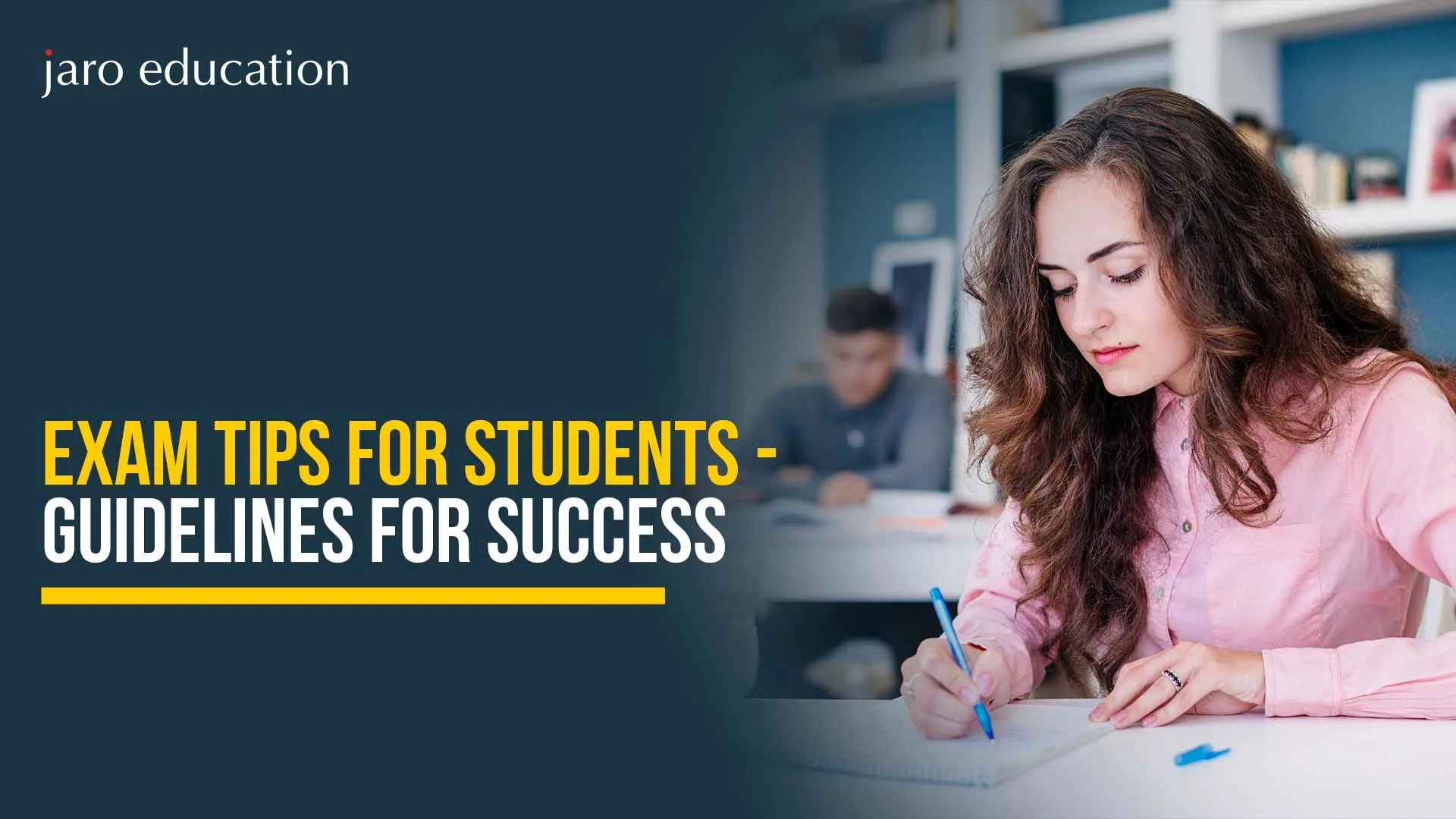Exam Tips for Students – Guidelines for Success

Table Of Content
- Exam Tips for Students: Things to Do
- Things to Avoid While Preparing for Entrance Exam
- Expert Career Counseling & Guidance by Jaro Education
- Conclusion
Exam Tips for Students: Things to Do
Things to Avoid While Preparing for Entrance Exam
Here are some key things to avoid:
Don’t Rely on Rote Memorization
When preparing for competitions or exams, focus on understanding the fundamental concepts rather than just memorizing them. Grasp the underlying reasons and theories behind the material. This approach helps the information stick in your mind more effectively. Aim to comprehend the core concept or theme of each question or topic instead of merely learning them by heart.
Avoid Prolonged Study Sessions
Avoid studying for extended periods without breaks. Shorter study sessions with breaks enhance focus and retention. The ideal approach is to study for 1 to 2 hours and then take a 10 to 15-minute break. The average human attention span is about an hour, so frequent breaks help maintain concentration.
Don’t Let Nerves Get the Best of You
Nervousness can confuse. Stay positive and confident in your preparation. Set aside a specific time to address any worries, but otherwise, focus on your preparation and visualize a successful outcome.
Avoid Last-Minute Cramming
Refrain from heavy, last-minute preparation, which can cause anxiety and lead to rote memorization. Trust in your preparation and abilities. Instead, spend 10-15 minutes before bedtime reviewing what you’ve learned throughout the day to reinforce your understanding.
Do not overwhelm yourself
Don’t let the pressure of coursework overwhelm you. Trust in the preparation you’ve done and stay confident.
Avoid Confusion
Confusion can often lead to incorrect answers and regret. Take a moment to breathe deeply, center yourself, and focus on what you know.
Do not ignore challenging subjects
If you find yourself procrastinating on challenging topics, stop! Delaying only makes it harder. Start tackling difficult subjects as soon as possible to put your brain in a receptive learning mode.
Avoid sleeping less or more
Adequate sleep is crucial. Ensure you get a good night’s rest before starting your study sessions or taking exams. However, avoid oversleeping as it can also be detrimental.
Dependability
While studying in groups can be beneficial, it’s crucial not to let them hinder your progress. Avoid relying too much on that academically outstanding friend. Trust in your abilities and stay focused on your own goals.
Late Start
If you think you can start late and still succeed, like the hare in the race, you might need to reassess your confidence. Starting early gives you a more relaxed and less stressful pre-exam period.
Do not get Anxious
During exams, it’s essential to manage stress effectively. Ensure you take regular breaks for entertainment to keep your mind fresh and avoid burnout.
Avoiding Confusion
Maintain clarity by keeping your subjects organized. Mixing up topics can lead to confusion and increased anxiety. Remember to revise regularly, as it strengthens your understanding and boosts your confidence.
Expert Career Counseling & Guidance by Jaro Education
Jaro Education has become synonymous with trusted career advice, having helped thousands of students and professionals take their first steps on their educational and career journeys. With thousands of success stories to tell, backed up by free alumni information on where our people work in globally ranked companies, Jaro Education powers the success of learners using expert career counseling and personalized guidance with industry-aligned programs. By providing learner support from end-to-end, from course selection to post-qualification career advancement strategy, Jaro Education can guide individuals to their goals and provide an opportunity to build those futures.
Conclusion
Preparing for entrance exams requires dedication, hard work, and effective study habits. By following these essential Exam tips for students, you’ll be well on your way to exam success. Remember to create a comprehensive study schedule that balances all subjects, practice regularly to reinforce your knowledge, and take care of your physical and mental health to maintain peak performance. Don’t hesitate to seek help when needed, whether from teachers, peers, or additional resources. Most importantly, stay positive and confident in your abilities. With these strategies, you’ll be better equipped to navigate the challenges of entrance exam preparation and achieve your academic goals.
Frequently Asked Questions
The best way to start exam preparation is by creating a study timetable, understanding the exam syllabus, and setting daily goals. This ensures you cover all topics systematically without last-minute stress.
Some effective exam preparation tips include breaking study sessions into smaller chunks, practicing previous year papers, revising regularly, and staying consistent.
To study for exams effectively, choose a quiet place, keep your phone away, use study planners, and take short breaks to stay focused and energized.
Top study tips for exams include making notes in your own words, using diagrams and flowcharts, practicing mock tests, and revising multiple times for better retention.
If you have limited time, focus on important topics, practice key questions, and revise formulas, definitions, and summaries. Time management is the key to success.
Find a Program made just for YOU
We'll help you find the right fit for your solution. Let's get you connected with the perfect solution.

Is Your Upskilling Effort worth it?

Are Your Skills Meeting Job Demands?

Experience Lifelong Learning and Connect with Like-minded Professionals


